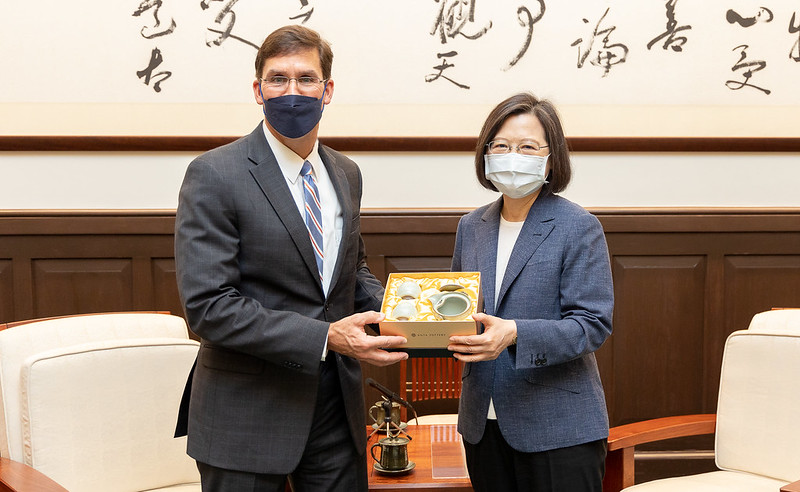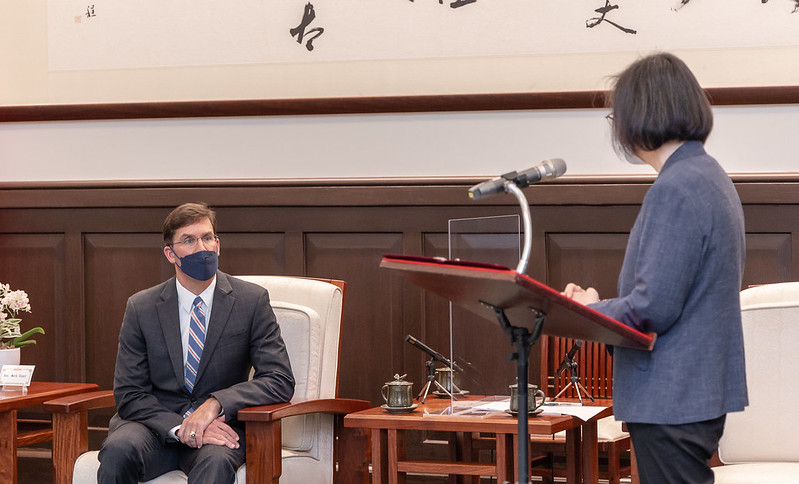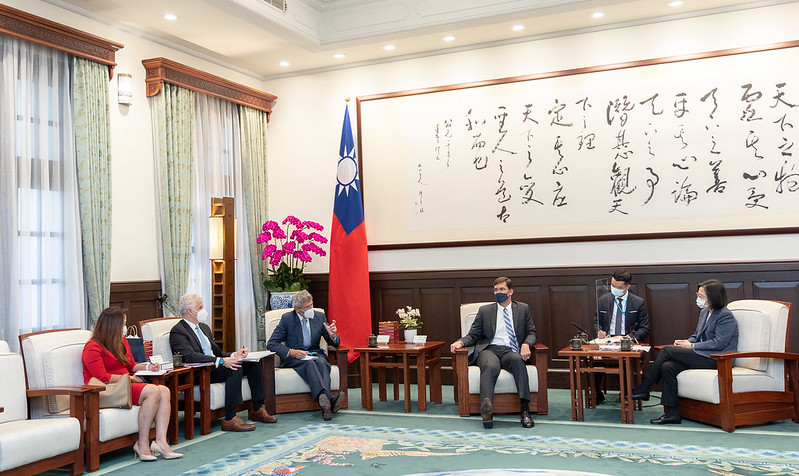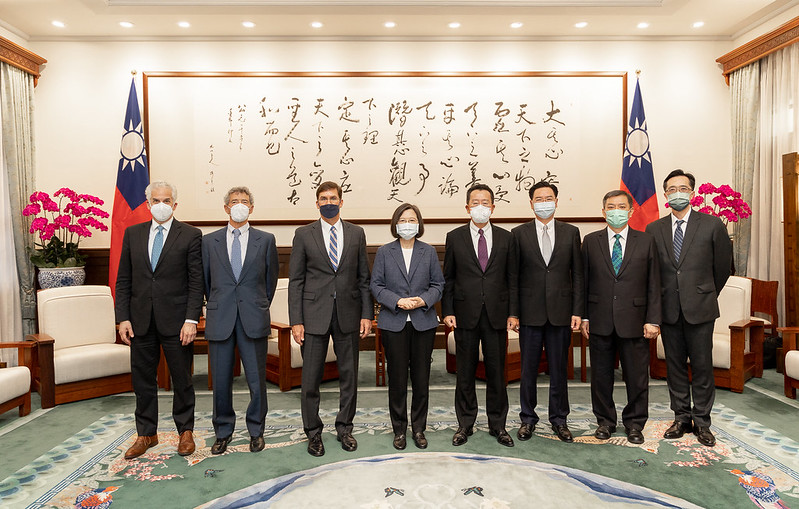News & activities
 News releases
News releases
On the morning of July 19, President Tsai Ing-wen met with a delegation from the Atlantic Council, a think tank based in Washington, DC. In remarks, President Tsai thanked the United States for continuing to fulfill its security commitments to Taiwan under the Taiwan Relations Act and the Six Assurances, and emphasized that Taiwan will keep strengthening cooperation with the United States, Europe, and other democratic partners to ensure peace and prosperity in the Indo-Pacific.
A translation of the president's remarks follows:
I want to extend a very warm welcome to our three distinguished guests. You have all served in key roles in government administrations. Today, thanks to the efforts of the Atlantic Council, you are making this joint visit to Taiwan. Your actions demonstrate US and European concern and support for Taiwan. For this, I am sincerely grateful.
In recent times, the United States, Europe, and Taiwan have faced many changes. The challenges of the pandemic, the expansion of authoritarianism, and Russia's invasion of Ukraine have all reminded us that democratic partners must bolster the strength of their alliances to jointly defend peace and the values of freedom and democracy.
Last month, the G7 Leaders' Communiqué reiterated the importance of peace and stability across the Taiwan Strait. We would also like to thank the United States for upholding its security commitments to Taiwan in accordance with the Taiwan Relations Act and the Six Assurances. Looking ahead, Taiwan will continue to strengthen cooperation with the United States, Europe, and other democratic partners to ensure peace and prosperity in the Indo-Pacific.
Also last month, the Atlantic Council issued its new Freedom and Prosperity Indexes. Taiwan ranked first in Asia and 18th overall in the Freedom Index, and 27th overall in the Prosperity Index. In terms of advancing economic and trade cooperation among the global community of democracies, Taiwan is willing and able to play an even more active role.
At the end of last month, Taiwan and the United States held the inaugural meeting of the US-Taiwan Initiative on 21st-Century Trade. Additionally, we look forward to Taiwan and the United States deepening economic and trade relations through such mechanisms as Trade and Investment Framework Agreement (TIFA) meetings and our Economic Prosperity Partnership Dialogue (EPPD).
To echo the European Union's Global Gateway initiative, we are also rolling out a plan to strengthen ties with Europe. By bolstering our connections with European nations, we are contributing to enhancing the solidarity among global democratic partners.
Your backing lends Taiwan the strength to continue moving forward. In particular, I want to thank former Secretary Mark Esper for his numerous expressions of support during his tenure as US Secretary of Defense and beyond.
Once again, thank you all for traveling so far to be with us. Please visit often, and let's continue to advance cooperation and exchange. In the meantime, I wish you a very successful trip. Thank you!
Former US Secretary of Defense Mark Esper then delivered remarks, a transcript of which follows:
Madam President, thank you for that wonderful introduction and for your kind words. Thank you also for hosting me and the Atlantic Council delegation today to discuss very important issues. As you noted, it's not just a US delegation, but European as well. After all, global challenges require a global response. Personally, for me, it's great to be back in Taipei, and to be joined by the wonderful freedom-loving people of Taiwan.
As secretary of defense, I made it a priority to make sure that the United States military and our allies were well prepared to deal with this era of great power competition that we are now in. Some doubt that such an era exists, but the recent unprovoked and brutal invasion of Ukraine by Russia proves that autocrats continue to exist in this world and present trouble to our democracies. But the greatest challenge facing the democracies of the West today is not in Russia. It is here in Asia, where China continues to challenge the rules-based international order that threatens freedom-loving peoples throughout the region. Taiwan is on the frontlines of this epic contest.
The mere existence of a thriving democracy with a robust economy and a freedom-loving people is anathema to everything the Chinese Communist Party believes. That is why that, in this era, it is important that the democracies of the West stand up and defend thriving democracies such as Taiwan against the bullying of your neighbor to the west.
If there's one issue that unites politicians in Washington, DC, it is the view that China is a strategic challenge for our country, and that Taiwan is a good friend that we must support and defend. This was a similar message that I carried while in office to our friends in Europe and in NATO meetings as well. So I was very pleased to see the NATO Strategic Concept come out and address the challenges that face the countries of the West, particularly Europe and United States.
I know that the delegation and I look forward to our meetings today with you and with members of your cabinet to discuss trade matters, diplomatic matters, economic integration, and, of course, security preparedness. It is my personal view that the [US] "one China policy" has outlived its usefulness, [and] that it is time to move away from strategic ambiguity. I think it's important that we begin that national discussion back in the United States. But it will help that discussion and help us educate the American people if we can also point to bold decisions being made in Taipei. Decisions such as a bold increase in defense spending. Decisions such as an adoption of asymmetric warfare and corresponding capabilities. Decisions such as lengthening conscription and making it more rigorous. And decisions such as improving reserve mobilization. It is important that the American people and our leaders in Washington fully see that the Taiwan people are fully committed to standing up to communist China and defending themselves, as we, the democracies of the world, stand behind Taiwan.
With that, Madam President, I want to thank you once again for meeting with us today. I want to thank you for your courageous leadership. And I look forward to our discussions this week. Thank you.
The Atlantic Council delegation included Ambassador Stefano Stefanini, former diplomatic adviser to President Giorgio Napolitano of Italy, and Atlantic Council Senior Vice President Barry Pavel.












